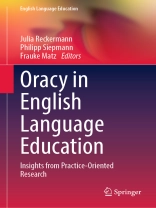This book innovatively connects the two fields of oracy and practice-oriented empirical research in English language education. It creates synergies and proposes innovative approaches to the study of oracy in the context of learning and teaching English as a second, additional or foreign language. The book also develops a contemporary and holistic concept of oracy, thus contributing to the theoretical discourse in this area of research.
The first part provides a general framework of different approaches to conducting practice-oriented research in English language teaching. It introduces the concept of oracy and discusses its relevance to language teaching. Design-based research and action research are outlined as two practice-oriented research approaches. The second part presents research on how oracy can be fostered and assessed at primary and secondary levels, while the third part focuses on tertiary education. The contributions to this book highlight the opportunities and challenges of conducting research in, on, and for classroom practice with stakeholders such as teachers, students, teacher trainees, university students, parents, and school administrators. They explore selected teaching methods, assessment and, finally, teacher education. The theoretical, methodological, and practical challenges of research-practice partnerships are also addressed.
This book demonstrates that innovative approaches to the development and assessment of oral skills can be developed through close collaboration between different stakeholders in language education. It serves as an inspiration for other educators and researchers in the field of English language education at all levels.
Inhaltsverzeichnis
Chapter 1. Introduction: Practice-Oriented Approaches to Researching Oracy in English Language Education.- Part I: Theoretical and Methodological Perspectives on Researching Oracy in English Language Education.- Chapter 2. Re-Framing Oracy in English Language Education.- Chapter 3. Oracy in the Primary EFL Classroom: Theoretical Considerations and Insights from Empirical Studies.- Chapter 4. Exploring the Teaching of Speaking through Action Research: Teachers’ Voice.- Chapter 5. Educational Design Research for Oracy Development: Why, What, How?.- Part II: Research on Fostering and Assessing Oracy in English Language Education.- Chapter 6. Foreign Language Anxiety and Speaking in English Drama Clubs: Results from a School-and-University Partnership.- Chapter 7.- Implementing an Innovation to Foster Oracy – On the Research-Practice Cooperation in a Design-Based Research Study in Foreign Language Teaching.- Chapter 8. The Challenge of Learning to Listen – Insights into a Design-Based Research Study in German EFL Secondary Education.- Chapter 9. Tasks Matter! Insights from a Design-Based Research Project on Oral Communication Exams in the Secondary EFL Classroom.- Chapter 10. Speaking Connects – Oral Exams at the Transition from the Primary to the Secondary EFL Classroom.- Part III: Enabling Pre-Service Teachers to Foster Oracy – Insights from Research on Teacher Education.- Chapter 11. Developing Chilean Pre-Service EFL Teachers’ Classroom Interactional Competence in Simulated Co-Teaching Practice Sessions.- Chapter 12. The Assessment of Oracy in the EFL Classroom: Introducing a Conversation-Analytic Method for Evaluating Interactional Skills.
Über den Autor
Julia Reckermann is junior professor for teaching English as a foreign language at the University of Münster, Germany. Her research focuses on young learners, teaching English in inclusive/heterogeneous classrooms, teaching and assessing speaking competences and research-based learning in teacher education. She is also a fully-trained teacher of English as a foreign language and has worked in different schools across Germany.
Philipp Siepmann is lecturer and researcher in the field of English Language Education at the University of Münster, Germany. His design-based post-doctoral research project investigates oral communication exams in the EFL (English as foreign language) classroom. His other research interests include teaching literature and cultures as well as content and language integrated learning (CLIL). As a fully qualified teacher, he has taught English and Geography (CLIL) at several grammar schools in Germany.
Frauke Matz is Chair of English Language Education at the University of Münster, Germany. Her areas of research include cultural learning, cosmopolitan, human and children’s rights approaches to English language education, the assessment of oral competences, and the role multiliteracies and literary texts in learning languages. She is also a fully qualified teacher of English in Germany, has the Qualified Teacher Status (England) and has worked in different schools in both England and Germany.












